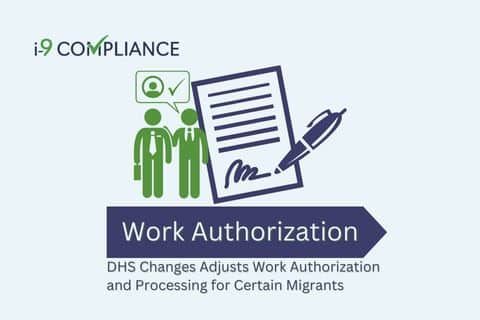DHS Changes Adjusts Work Authorization and Processing for Certain Migrants

October 10, 2023
The U.S. Department of Homeland Security (DHS) announced that it will begin implementing changes to the Employment Authorization Documents (EADs) application process. One example of the changes includes prioritizing some applications. In addition, it would issue EADs with extended validity periods.
These EADs would benefit eligible immigrants, improving their opportunity to acquire work authorization. The DHS’s actions come as a response to calls for accelerated processing for work authorization. In addition, the Department announced several measures to improve and update its policies and procedures. These changes would improve its EAD processing, including an accelerated process for eligible applicants.
Beginning October 1, 2023, the U.S. Citizenship and Immigration Services (USCIS) will start accelerating processing for EAD applications. This processing will apply to parolees’ applications filed through the CBP One app. According to the DHS, unlike asylum seekers, these parolees are immediately eligible for work authorization.
The DHS will also assign additional personnel and adjust processes to decrease the median processing time for EAD applications. This adjustment would change the processing time from 90 days to 30. In addition, it will prioritize achieving the same 30-day processing time for applications filed under the Cuban, Haitian, Venezuelan, and Nicaraguan parole programs.
The DHS also recognized that many desire a similar acceleration in processing for asylum seekers. However, the Department revealed how current laws make this request impossible. Federal law stipulates that asylum seekers may legally obtain work authorization at least six months after filing their claim.
Furthermore, the Department remarked that USCIS will increase the validity periods for EADs held by eligible individuals. According to the DHS, this includes: “those admitted as refugees or granted asylum; recipients of withholding of removal; and applicants for asylum, adjustment of status, or cancellation of removal.”
With an increased validity period, the DHS aims to reduce how often individuals must file for EAD renewals. This increase has a two-fold impact: Reducing the likelihood of gaps in work authorization for beneficiaries and reducing the workload on the USCIS processing renewal applications. As a result, the agencies can spend more time reducing processing time for initial work authorizations.
These changes to work authorization will benefit employers by providing a larger labor pool. It also reduces how often they must reverify employees’ employment eligibility (Form I-9). Until then, employers should consider using an electronic I-9 management system to improve the employment eligibility verification process. This tool guides employees through the process and provides reminders of when to take action.
Automate your employment eligibility verification today with the ensured compliance of I-9 Compliance.